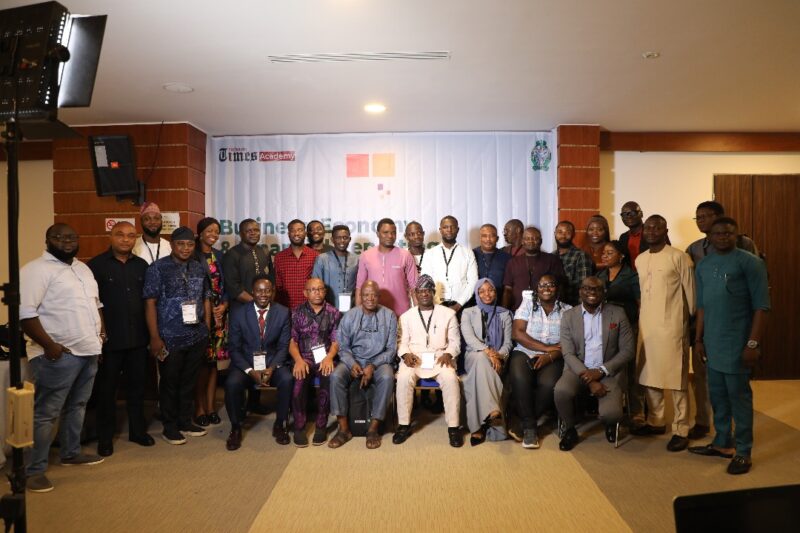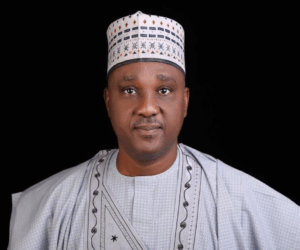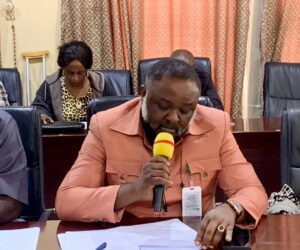Journalists from major newsrooms across Nigeria have completed a two-day intensive training on business, economic, and financial reporting, organised by Premium Times Training Academy with support from the Central Bank of Nigeria (CBN).
The training took place in Abuja on 12 and 13 November and was led by industry professionals, aimed to equip reporters with the skills to produce ethical, data-driven, and impactful stories that accurately reflect Nigeria’s economy and financial landscape.
The training came at a time when accurate and responsible economic reporting is critical. Policy decisions directly affect living standards, healthcare, infrastructure, and economic opportunities, and facilitators argued that journalists play a central role in shaping public understanding and confidence.

Data access
Musikilu Mojeed, the editor-in-chief of Premium Times, urged reporters to use available economic data, noting that credible information is widely accessible online. “If you want to report with authority, you must use data and credible resources,” he said.

He highlighted key sources, including the World Bank, IMF, African Development Bank, and domestic platforms such as the Federal Inland Revenue Service and the Budget Office, which publish proposals, appropriation laws, implementation reports, and historical budgets dating back to 2009.
These records allow journalists to track government priorities, spending gaps, and shifts in policy over time.
Mr Mojeed also pointed to the Nigeria Investment Promotion Commission, the Central Bank’s research publications, and the Nigeria Exchange (NGX), where listed companies disclose market-moving information, ownership changes, and annual reports revealing their financial health.
“Journalists who master these tools will consistently produce stronger, more impactful business stories,” he added.
Ethics standards
Idris Akinbajo, the managing editor of the newspaper, emphasised that journalism ethics must be global, not local.
“Ethical rules are not optional. They are guiding principles: accuracy, fairness, and public accountability,” he said.
He warned against over-reliance on local or cultural biases, unverified reports, and statements from spokespersons without independent checks.
Mr Akinbajo stressed that journalists must build capacity, avoid conflicts of interest, and resist unethical practices such as brown-envelope journalism. Credibility and accuracy determine how the world perceives countries and institutions.
Monetary policy
CBN’s Director of Monetary Policy, Victor Oboh, focused on the technicalities of economic reporting, highlighting how poor coverage of monetary policy can trigger panic, distort public expectations, and even destabilise an economy.

“Some headlines can send shock waves across the economy,” he said.
He explained that monetary policy aims to maintain low and stable inflation, while fiscal authorities focus on spending and job creation.
Coordination between the two sides is essential, but the Central Bank’s primary mandate remains price stability.
Journalists must distinguish between core and food inflation, understand monetary tools like OMO, CRR, and MPR, and consider how excess liquidity from Ways and Means, FX inflows, and past interventions must be controlled to curb inflation.
He also highlighted that the CBN has returned to orthodox central banking, allowing the naira to find its market value and focusing on exchange-rate stability rather than artificial strength.
Improvements in reserves, foreign inflows, current-account surpluses, and bank recapitalisation, they said, signal underlying resilience, even if interest rates remain high until inflation moderates.
Context
Zeal Akaraiwe, a financial market expert, highlighted the dangers of incomplete reporting and selective narratives. “Tell the truth, tell the whole truth, and understand its weight before you hit publish,” he said.
He urged journalists to provide full context, dig for comprehensive data, and seek expert explanations, particularly when reporting Central Bank reforms and economic policy.
Rushed or partial reporting, he warned, can fuel panic, distort public perception, and weaken confidence in the economy.
Fact checking
David Ajikobi, the editor of Africa Check stressed that fact-checking is now a global discipline essential for navigating Nigeria’s complex information environment.
“The people who create fake news actually think like us journalists, while we are looking for stories, they are producing them,” he said.
![David Ajikobi, the editor of Africa Check during the training [PHOTO CREDIT: PREMIUM TIMES]](https://i0.wp.com/media.premiumtimesng.com/wp-content/files/2025/11/033A0036-scaled.jpg?resize=2560%2C1707&ssl=1)
He explained that verification requires confirming sources, reviewing evidence, consulting experts, and ensuring conclusions do not endanger lives.
Mr Ajikobi warned that the growing misinformation ecosystem, including manipulated videos, impersonated sources, and politically driven disinformation, can mislead the public and distort national discourse.
Perception
The founder of The Africa Soft Power Group, Nkiru Balonwu, focused on framing and tone in reporting, highlighting their impact on public confidence and perception.
“If you’re telling the truth, make sure it’s the whole truth, and make sure you know how your truth impacts your own home,” she said.
![The founder of The Africa Soft Power Group, Nkiru Balonwu, focused on framing and tone in reporting [PHOTO CREDIT: PREMIUM TIMES]](https://i0.wp.com/media.premiumtimesng.com/wp-content/files/2025/11/033A0009-scaled.jpg?resize=2560%2C1707&ssl=1)
Ms Balonwu argued that repeated negative narratives in Nigerian media can undermine public confidence and economic stability, contrasting local coverage with more restrained reporting in countries like Britain and Ghana.
She urged journalists to balance criticism with evidence of progress, recognising that positive indicators often receive little attention while gloomy narratives dominate headlines.
Election spending
Paul Alaje, senior economist at SPM Professionals, highlighted the economic risks of election spending ahead of Nigeria’s 2027 general elections.
He noted that politicians’ history of vote-buying often involves large foreign currency expenditures that destabilise the economy.
“The pre-election year often sees the highest economic growth, but immediately after, the economy starts to nose-dive. Politicians across all parties contribute to this instability. To address this, all election spending should be conducted in naira, and the EFCC must monitor compliance,” he said.
Mr Alaje warned that dollar inflows during elections deplete reserves and create exchange-rate instability, urging journalists to scrutinise election-related economic activity closely.
READ ALSO: Tinubu reappoints Marwa as NDLEA chair
Over the two days, 25 journalists, guided by nine facilitators, explored how media coverage influences economic outcomes, the role of ethics in maintaining public trust, and practical tools for accessing and verifying open-source economic data.
![Participant being awarded certificate at the training [PHOTO CREDIT: PREMIUM TIMES]](https://i0.wp.com/media.premiumtimesng.com/wp-content/files/2025/11/033A0126-scaled.jpg?resize=2560%2C1707&ssl=1)
By the end of the programme, participants were charged to apply ethical principles, interpret key economic indicators, and produce stories that inform, educate, and responsibly influence public discourse.
The training reinforced a central message that accurate, ethical, and context-rich reporting is essential not only for professional credibility, but also for the broader stability and perception of Nigeria’s economy.









